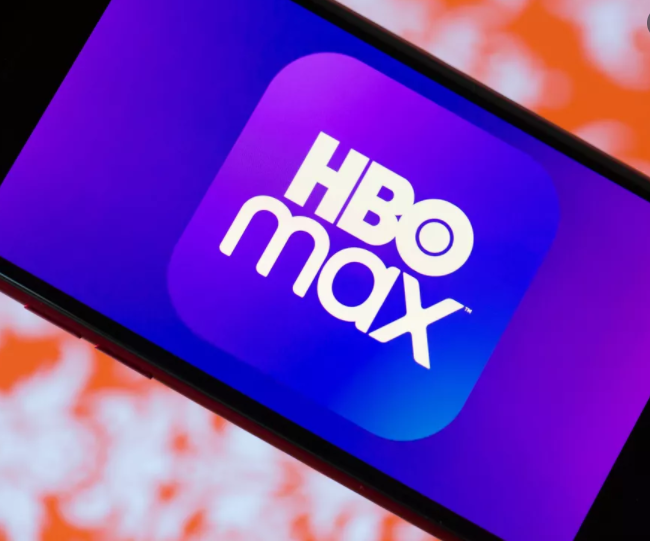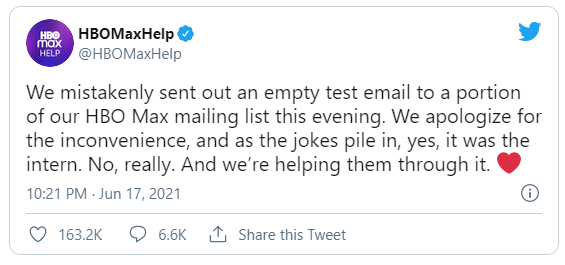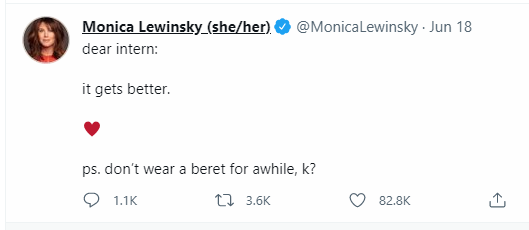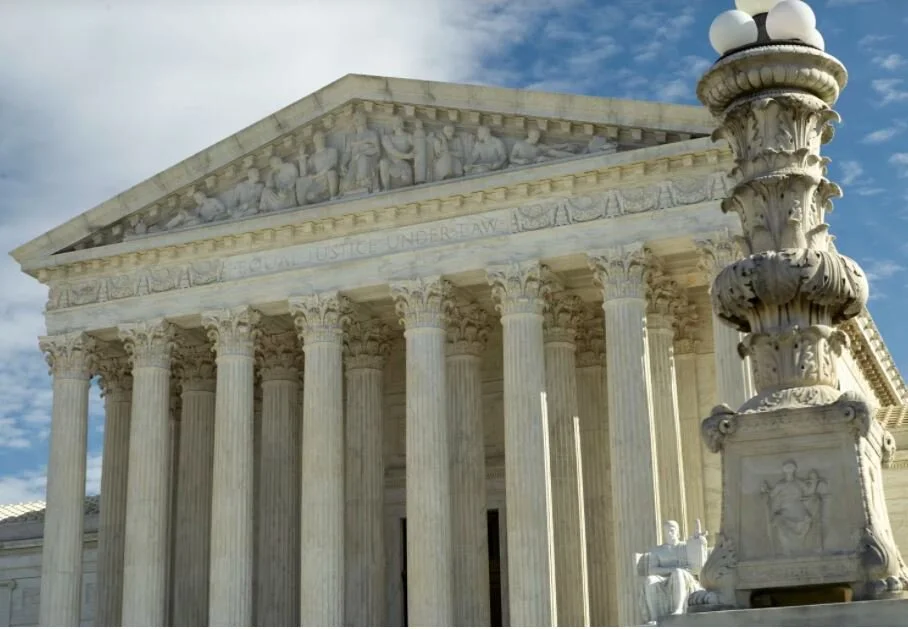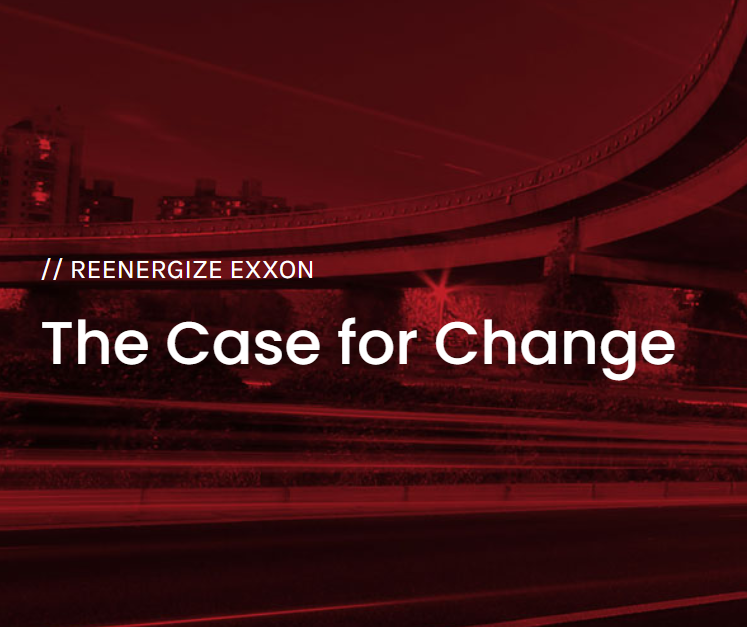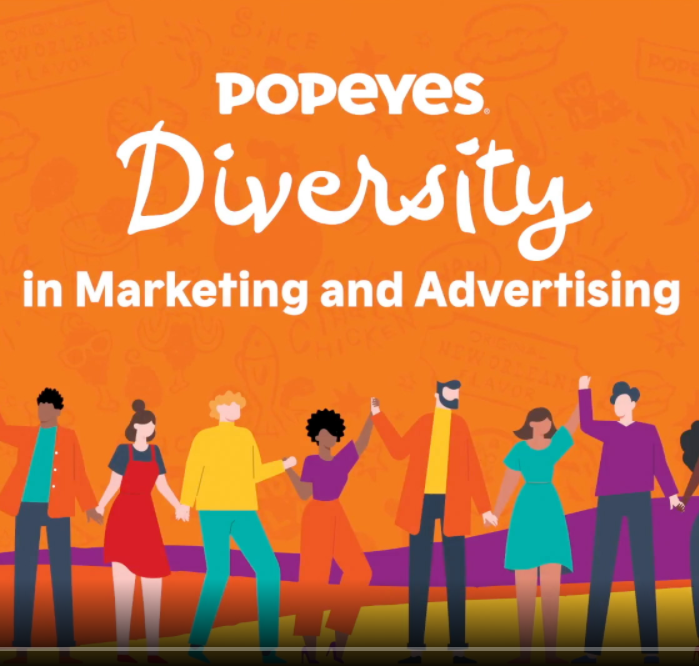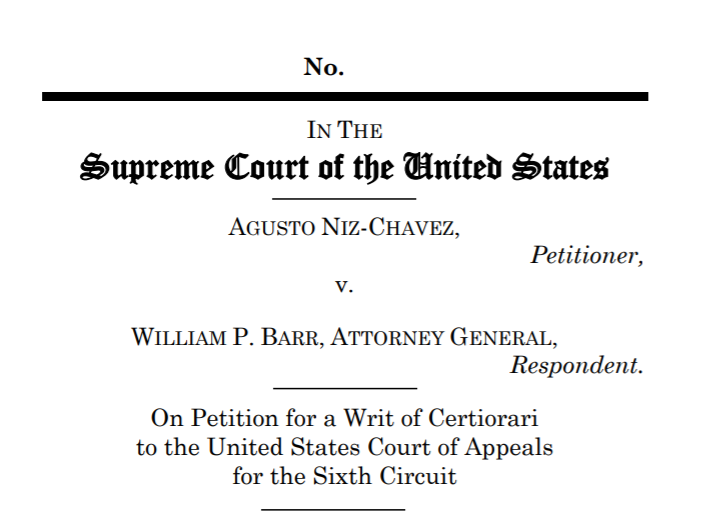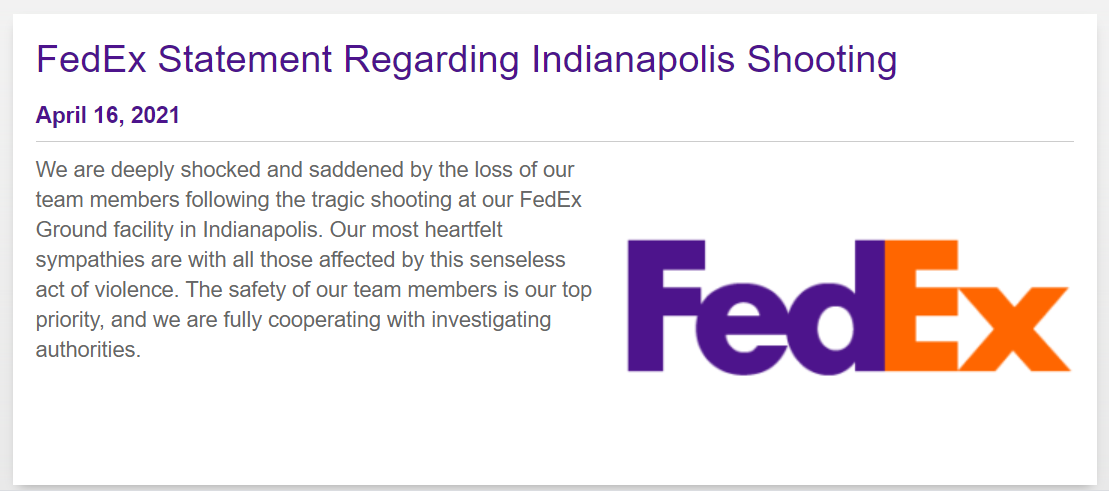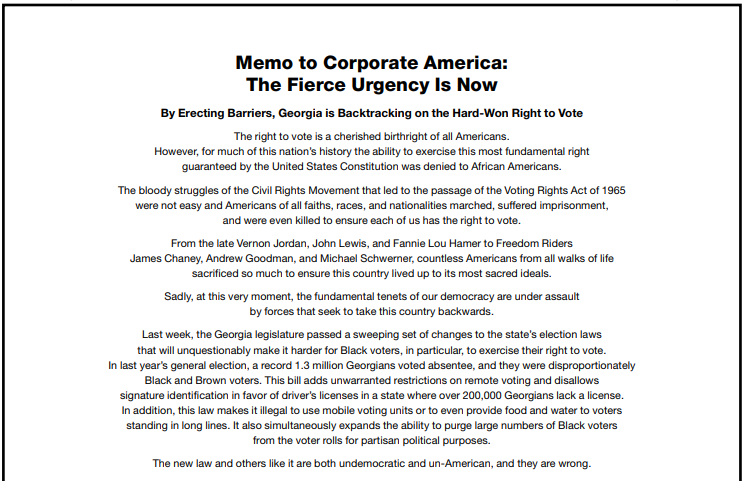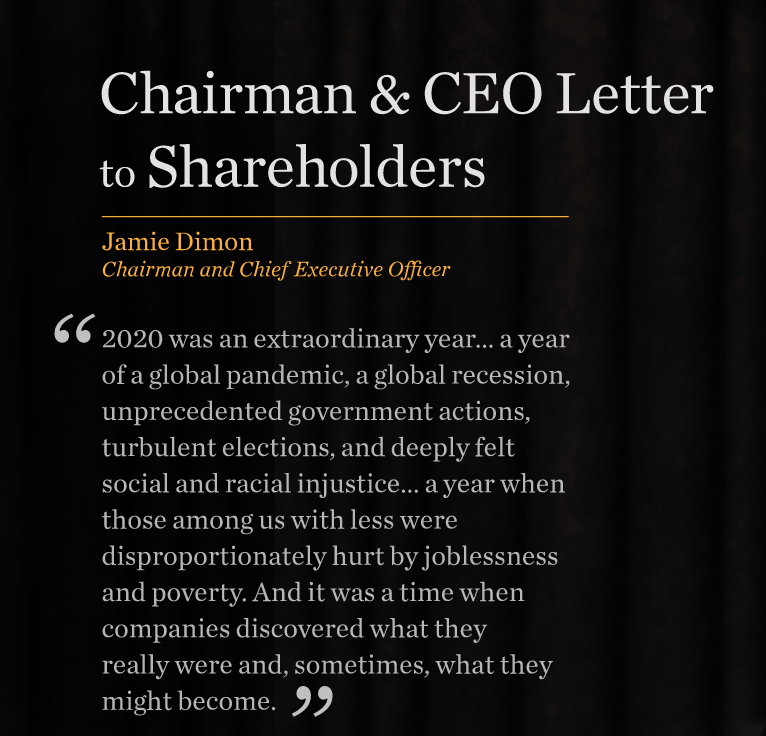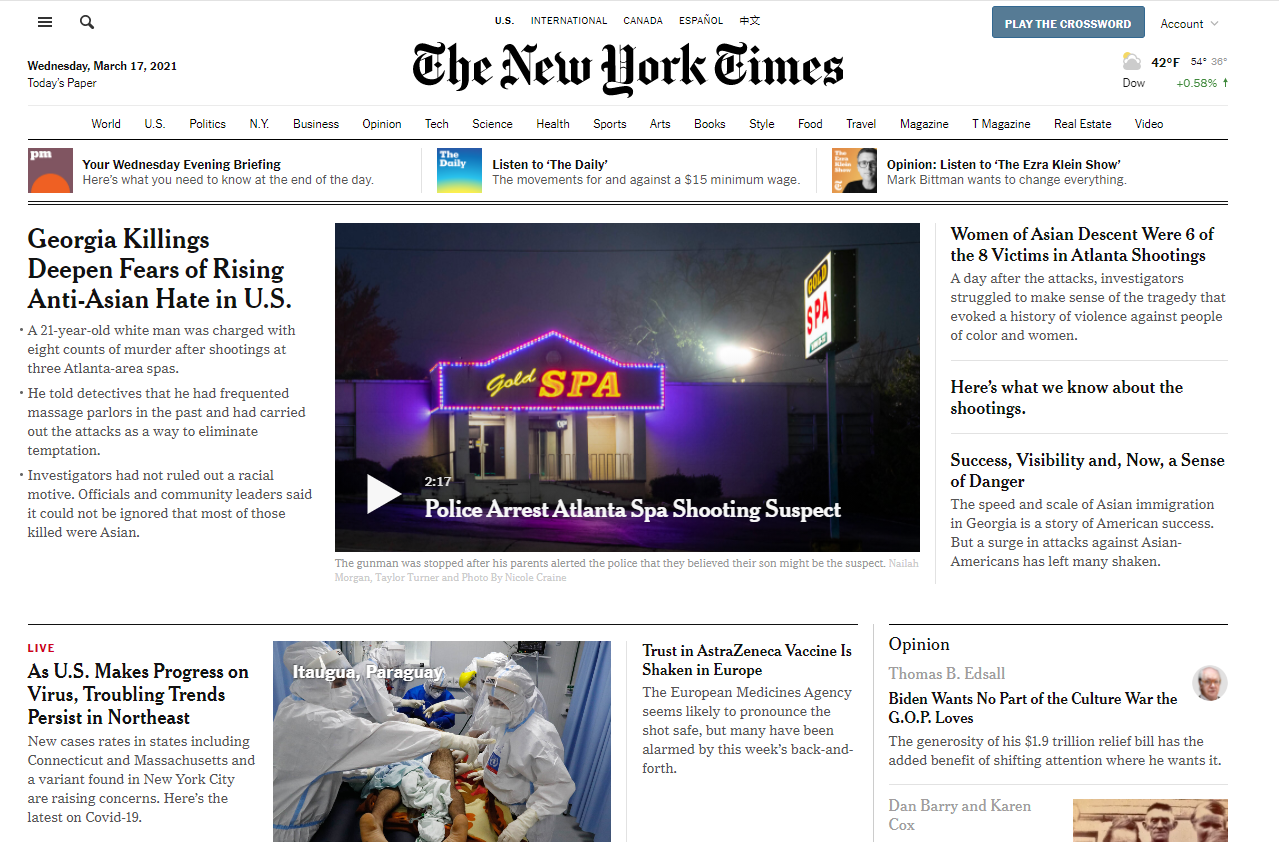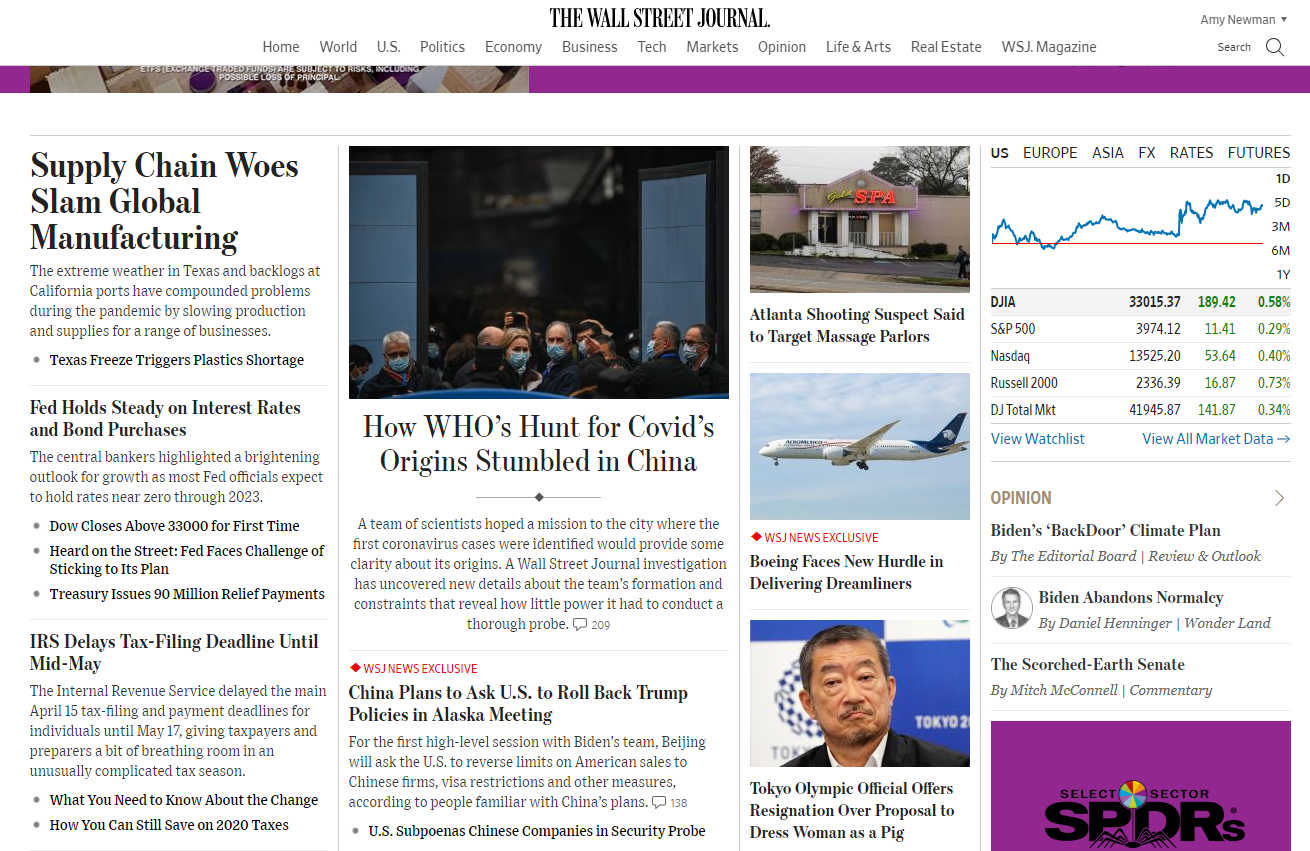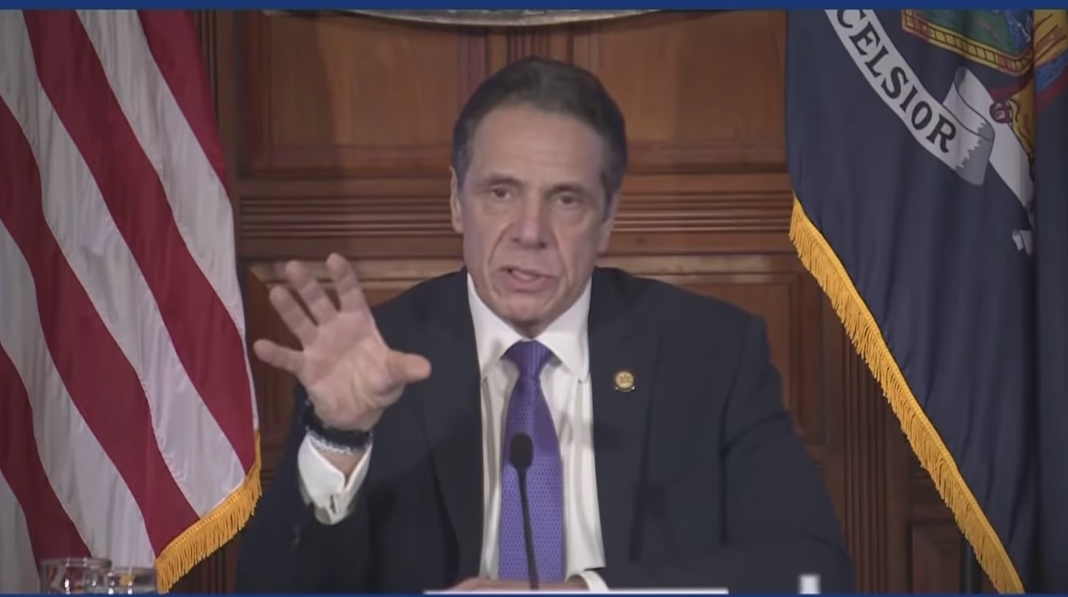Blame the Intern
HBOMax customers received an email with the subject, "Integration Test Email #1,” that obviously wasn’t intended for them. In a follow-up email, the company blamed an intern for the mistake.
Twitter responses poured it to support and empathize with the intern. Embarrassing stories ranged from sending emails to big groups to typos. As an intern, someone replaced all “parties” to “panties” in a 50-page legal document (dare I say “brief”?).
The best was when Monica Lewinsky weighed in.
Interns make mistakes; we all do. Facing the situation with humility—the ability to learn—is the best approach. The HBOMax situation could have been a lot worse, and fortunately, the public turned it around to focus on the shared experience we have all had.
Free Speech Case
In an 8-to-1 vote, the U.S. Supreme Court ruled that a high school cheerleader could use F-bombs on social media. The student was suspended from the team after posting a video and disparaging the team and the school. But the court upheld her right to free speech.
The justices did say that the school has the right to take action when a student’s behavior in person—or online—is disruptive to the classroom, but they didn’t believe that this case warranted the school’s decision.
This was an important decision but left the door open to other cases. As one attorney said, the decision was “common sense,” but others might be greyer and more complex.
Resume Gaps
A Wall Street Journal columnist tells us, “Don’t Sweat Your Pandemic Résumé Gap.” High school students have gotten a reprieve from taking some standardized tests for college applications, and that generosity seems to have extended to prospective employees. People faced all sorts of challenges during the pandemic, and this reporter argues that employers will let it slide.
A survey of recruiters found that 49% believe a gap is now acceptable instead of a red flag. Recruiters say you don’t need to over-explain a gap, which could be due to family obligations. Instead, have a concise statement prepared such as, “I was glad to spend time with my family, and now I’m excited to get back to work.”
It will look good if you attended classes or earned a certificate during your time off, but that isn’t essential. At the same time, the optimistic article offers a warning: more than two years out of the workforce makes it difficult to re-enter.
I’m glad to see this article and hope the sentiment extends beyond pandemic times. I am a bit concerned about the survey response. If 49% of recruiters will make allowances for time off, what about the other 51%? Of course, the news affects women more than men because women were more likely to be home during the pandemic.
Persuading Wall Street
The Wall Street Journal describes a hedge-fund manager’s decision to convince Wall Street investors to improve Exxon’s board oversight. A former coal mine owner, Christopher James spent $250 of personal funds to rally support from other fund managers and win three board seats to encourage environmental, social, and governance (ESG) changes at the company.
Exxon was vulnerable, and the timing was right. James created an organization, Engine, which wrote an open letter to Exxon and shareholders. The demands include “putting the Company on a path to net zero total emissions by 2050.”
James says his inspiration came from a conversation with his children:
The hedge-fund manager’s school-aged sons asked him how he could consider himself an environmentalist if he invested in energy companies, and Mr. James said he struggled with his explanation.
“As I was listening to myself talk, I thought `I am really splitting hairs on this.’” One of his sons, he said, “had this look on his face where his forehead wrinkled. He didn’t buy it.”
James also said, “I can get rid of this compartmentalization. I could realign my values with an investment thesis.”
This story is a great example of integrity and courage character dimensions. James is living his values and took action despite risks.
Grubhub's Goodwill Message
Grubhub is demonstrating gratitude with an ad directed primarily toward restaurants. The company benefitted greatly during a tough year for restaurants. During COVID restrictions, food delivery services did well, raising prices and cutting into restaurants’ margins. Grubhub and others have been criticized for hefty commissions and for listing restaurants on their sites when they weren’t affiliated with the service.
Now that restrictions are lifting, analysts predict that delivery services will continue to thrive. Still, an AdAge author notes that Grubhub needs to “remain relevant as in-person dining comes back.”
In the commercial, Grubhub speaks to restaurant workers:
“Here’s to you, restaurant. Thank you, from the bottom of our stomach. . . . Without you, we wouldn’t be Grubhub. We’d just be ‘hub.’”
Will the commercial ring false? Will it feel to restaurant owners and staff that Grubhub is manipulative or insincere? I don’t know. Obviously, the secondary audience is diners.
Senders of true goodwill messages, for example, messages of appreciation, don’t expect anything in return. Thank-you messages may bring about favor, but they are not intended for future reciprocation.
Popeyes Publishes Diversity Scorecard
Popeyes fast-food chain is publishing its diversity data related to marketing. The company will provide data about females and ethnic diversity among those represented in ads and members of creative teams, marketing departments, and external ad agencies.
With vivid colors and eye-catching graphics, the “scorecard” shows demographics at-a-glance. The chart is easy to understand and shows clearly where the company has more work to do. Text on the webpage admits deficiencies:
“We acknowledge our own lack of diversity and our commitment to be better, more diverse, and more inclusive. So today, we want to share our starting point.”
Text also draws conclusions for each group, for example, the ad teams:
“Our agency teams demonstrate the highest gender diversity of any pillar, but continue to lack in racial and ethnic diversity amongst Black/African-Americans.”
Popeyes’ approach is solid for improving diversity—and getting publicity. The Wall Street Journal article reflects well on the company. For the webpage, the “mandates” work well to identify targets, although they seem easily achievable. I don’t see on the webpage why diversity is important. Beyond the obvious—to increase market share—so what?
The scorecard is a good example of transparency but can be improved in other ways. A summary would give an overall percentage that can be tracked more easily over time. Also, I wonder about employees and partners who don’t identify as either male or female. Maybe that non-binary group could be represented as well.
Lego: "Everyone Is Awesome"
Lego is celebrating the LGBTQIA+ community with a new rainbow-colored set. The set will be available on June 1—the start of Pride Month. The designer explains the decision for the “Everyone Is Awesome” product:
“I am fortunate to be a part of a proud, supportive and passionate community of colleagues and fans. We share love for creativity and self-expression through Lego bricks and this set is a way to show my gratitude for all the love and inspiration that is constantly shared.”
The designer also explained that the characters intentionally have no specified gender.
In a press release, the company describes the purpose:
“Everyone is unique, and with a little more love, acceptance and understanding in the world, we can all feel more free to be our true AWESOME selves! This model shows that we care, and that we truly believe ‘Everyone is awesome’!”
The product is a good example of company leaders taking a stand. They might alienate some customers, but they are holding true to their values, stated at the bottom of the release:
“The LEGO Group is committed to building a diverse and inclusive workplace. It partners with Workplace Pride, Stonewall and Open for Business to help shape strategies to support employees who identify as LGBTQIA+ and allies across the company. It also supports UK-based charity, Diversity Role Models which works to educate children about inclusivity and empathy in order to build supportive and inclusive future generations.”
Waitlisted Student Markets Himself
George Joseph White V was waitlisted from Cornell’s Dyson School, and he decided to promote himself. He advertised on the outside of a local bus with a photo of himself and his website. On his website, georgecantwait.com, White lists his hobbies, interests, and other information. He also includes quotes from a few of his teachers.
The approach certainly is creative and gutsy, but is it appropriate? From a business communication perspective, we consider the audience and the message. White describes his qualifications, but he doesn’t say much about how could contribute. What would he bring to the school that might differentiate him from other students on the waitlist?
White also is interviewed by a local radio station, which is posted on his website. He says he believes he’s qualified, and the only reason he wasn’t accepted is that the number of applicants increased. The number did increase, partly because of the pandemic and students taking a gap year and partly because Cornell dropped the SAT/ACT requirement.
Still, perhaps other students were simply more qualified than White, and that’s why he didn’t get in. White also chose an approach that isn’t available to all students: spending money on ads and a website.
When I asked students about the situation in class, they were mixed. Some respected his perseverance, while others thought his approach was too self-promotional and unfair. As one student wrote in chat, “It’s a WAIT list.”
Peloton Announces Recalls
After resisting action despite consumer product warnings, Peloton has conceded and is recalling two models of its treadmills. One child died and more than 70 people were injured, so the Consumer Product Safety Commission (CPSC) recommended the recalls a month ago.
In the company statement, CEO John Foley admitted the mistake:
The decision to recall both products was the right thing to do for Peloton’s Members and their families. I want to be clear, Peloton made a mistake in our initial response to the Consumer Product Safety Commission’s request that we recall the Tread+. We should have engaged more productively with them from the outset. For that, I apologize. Today’s announcement reflects our recognition that, by working closely with the CPSC, we can increase safety awareness for our Members. We believe strongly in the future of at-home connected fitness and are committed to work with the CPSC to set new industry safety standards for treadmills. We have a desire and a responsibility to be an industry leader in product safety.
The CPSC said the decision came after “weeks of intense negotiation and effort.” Peloton will suffer financially: the company has stopped selling the treads and is offering a full refund of more than $4,000 for the products. But executives may have spared themselves and the brand some reputation damage if they had acted earlier.
Supreme Court Decision Rests on "a"
An extraordinary Supreme Court ruling was based on one of the smallest words in the English language: a. An immigration law requires that people who might be deported receive “a notice to appear.” Does that mean only one, or could the notice be divided into two?
Justices ruled that the law requires one and only one. The ruling is significant because Agusto Niz-Chavez, an immigrant from Guatamala who has been in the United States since 2005, received two notices, each requiring different documents.
Immigrants who have 10 consecutive years in the United States have an easier time staying. But a deportation document means that the clock stops. In Niz-Chavez’s case, because he received multiple notices, his attorney claimed that his clock didn’t stop—and most justices agreed.
This case is significant also because three conservative justices ruled with the liberal justices, who formed the majority.
Other legal cases have hinged on punctuation marks, but this is the first I remember that rested on such a small article of speech. Legal writers will heed the warning to craft regulations more carefully in the future.
Viral Spotify Resume
A college student created a resume that mirrors the Spotify app, and she got a lot of attention. Included in the more 300,000 views is a manager at Spotify who encouraged her to apply for a product manager internship.
Emily Vu’s creativity paid off: she got the job.
Emily was looking for a creative job. I’m not sure this same approach would work for, say, a data analyst position at a hedge fund. She also posted it with the “f” word (with an asterisk and redacted here). Not every employer would appreciate this either.
But Emily took a risk, which worked for Spotify—and for many others who admired her resume.
FedEx Statement About Shooting
After a shooting at an Indianapolis facility, FedEx posted a statement on its website. At the top of the home page is a notice: “We are deeply shocked and saddened by the loss of our team members following the tragic shooting at our FedEx Ground facility in Indianapolis. Read more.”
The company posted two additional statements on its website under “Newsroom”:
“Honoring Our Team Members in Indianapolis” lists employees who were killed.
“Frederick W. Smith Message to Team Members on Indianapolis Tragedy” is a message from the Chairman and CEO.
Each message is heartfelt and opposes violence with such phrases as “Violence of any kind has no place in our society or our workplace” and “senseless act of violence.” But the company is avoiding any mention of guns and the two longer messages don’t mention that the victims were shot. The only reference is in the title and body of the first statement: “shooting” is used twice.
The cause of death is important to include, particularly so that FedEx deflects responsibility. This is also an opportunity for CEO activism, as we have seen from other CEOs recently. However, FedEx is not entering this highly charged political conversation at this time.
Amazon’s Statement About the Failed Union Attempt
Employees at Amazon’s Bessemer, Alabama, warehouse voted against forming a union. Of 5,876 employees, 1,798 voted against and 783 for the union—not enough. The New York Times presents a simple, clear graphic of the vote.
Critics say that Amazon used aggressive tactics to deter workers from favoring the union. For example, union organizers approached employees at a traffic light, which the city changed based on a request from Amazon management. The change led to longer green lights and shorter red lights based on traffic. Before the vote, the National Labor Relations Board (NLRB) determined that two employees were fired illegally for their union-organizing activity.
In messages to employees, the company used a slogan, “Do it without dues,” meaning employees should negotiate with their managers and not through a union, which charges fees. The slogan was also the URL for a website, which has since been removed.
Amazon posted a statement about the win. The company denies intimidation charges and reinforces its $15 wage and starting benefits. Although the statement indicates that 16% of employees at the facility voted for the union, a higher percentage of those who voted were favorable towards the union.
CEOs Speak Out
JPMorgan Chase published its Annual Report, leading with a letter from CEO Jamie Dimon. The introductory paragraph and corresponding callout quote reflect a leader’s and a company’s grappling with an extraordinary year.
Like many company leaders today, Dimon addresses societal issues directly. We’re seeing increasing employee and CEO activism, and this letter is a good example.
A Wall Street Journal opinion piece questions when leaders are even more direct about political events, such as Black leaders in Georgia speaking out against the election law decision. The law restricts voting rights, which doesn’t affect the companies directly. The WSJ editorial board writes, “To wit, they are pitting themselves against the interests of their own shareholders.”
The open letter appeared as a full-page ad in The New York Times, signed by Black CEOs, former CEOs, and others of major U.S. companies.
In my view, the CEOs demonstrate leadership character, particularly authenticity, courage, and integrity. By definition, demonstrating character carries some personal risk.
AstraZeneca's Data Problems
AstraZeneca has been accused of presenting “outdated and potentially misleading” data about the vaccine that has suffered implementation trouble in Europe. In a press release and a CNBC interview with the president, the company reported a 79% effectiveness rate, despite later results between 69 and 75%.
A group of independent experts wrote a letter to U.S. government officials to express their concern, as The Washington Post reports:
The DSMB is concerned that AstraZeneca chose to use data that was already outdated and potentially misleading in their press release,” the letter states. The data “they chose to release was the most favorable for the study as opposed to the most recent and most complete. Decisions like this are what erode public trust in the scientific process.”
The company promised a review: “We will immediately engage with the independent data safety monitoring board to share our primary analysis with the most up to date efficacy data.” But damage is already done.
The Washington Post explains, “But it appears to be the latest in a series of self-inflicted wounds from the team behind the vaccine, which has had months of stumbles involving messy science and bungled communication.”
This latest misstep only complicates a possible U.S. rollout and breeds more skepticism in those who fear the vaccine. Fears in some populations, such as Black Americans, are based on understandable mistrust of the healthcare system, and this news will not likely inspire more participation in plans for herd immunity.
As an issue of credibility, AstraZeneca is caught in a public quagmire. What might have been a small misstep is now viewed as part of a larger, potentially intentional plan to deceive, whether or not that is true. The company’s integrity is in question because they have not been fully transparent about the vaccine results.
Comparing News Reporting About Shooting
How the media reports news reveals their political leanings and inherent biases. Compare the home pages of the New York Times and the Wall Street Journal from screenshots taken the evening of March 17, 2021.
The New York Times led with the news and posted five stories at the top of the page. Stories focus on “Anti-Asian Hate in the U.S.” The Wall Street Journal posted one small article, and the headline makes no reference to the victims—six of the eight were Asian women.
I’m struck by the surrounding articles on the WSJ home page. The business and economy focus makes sense for the paper’s mission, but several other articles imply negative messages about Asians or Asian countries.
The headline about the Tokyo Olympics official, particularly, is quite inflammatory (or as a student in class said, “clickbait”). Although the news is notable given that this is the second official to resign for negative comments about women, the photo and headline, below news of the shooting is, as my partner said, “insensitive.” Do we need the actual negative statement?
Also in fairness to the WSJ, the shooter had not (and as of this writing, has still not) been charged with a hate crime, and he denies the association of bias. Perhaps the NYT is fueling the flames of xenophobia?
And yet, discrimination, bias, and violence against Asians and Asian Americans has been increasing in the U.S. Shouldn’t that be a significant part of any reporting about this terrible shooting?
Royal Family Responds to Racism Allegations
In an interview with Oprah, Prince Harry and Meghan Markle accused the British royal family of racism, and the fallout is severe. Markle talked about having suicidal thoughts and how she had been treated by the family, including plans for the couple’s baby. She said he wouldn’t have a title or security, and that the family had “concerns and conversations about how dark his skin might be when he was born.”
Prince Harry said that he a discussion with his grandmother and two with his father about the couple’s concerns until his father “stopped taking my calls.”
Victoria Murphy, a writer for Town & Country magazine, describes the family’s reaction:
So far, the royal family has remained tight-lipped. There have been no statements and, it seems, very little guidance offered. Perhaps they are retreating into a default “no comment” stance, or perhaps they are sensibly waiting to see what sticks before deciding whether to add fuel to the fire. In this war of words, there is a sense that we could go on and on.
Buckingham Palace did release a short statement, and the Queen took some time before signing off:
The whole family is saddened to learn the full extent of how challenging the last few years have been for Harry and Meghan.
The issues raised, particularly that of race, are concerning. While some recollections may vary, they are taken very seriously and will be addressed by the family privately.
Harry, Meghan and Archie will always be much loved family members.
Of course, the issue is that the royal family is a public organization, with several public figures, whether they wish to be or not.
Two days later, Prince William gave an interview and said, “We’re very much not a racist family.”
Murphy sums up the situation: “Make no mistake, this is an interview that will go down in history as having rocked the British royal family to its core.”
Beware of Overtalking During Zoom Interviews
People seem to be talking too much during video interviews. A Chronicle of Higher Education article describes two possible reasons.
One is that job candidates want to build relationships and may overtalk in a somewhat desperate attempt to connect. After a year without intimacy, we might be overcompensating. I can imagine this applying to other types of meetings and presentations as well.
Second, visual cues are tough to see on video. The void isn’t quite as cavernous as during phone interviews, but still, it’s difficult to see subtle gestures. Imagine that an interviewer is leaning forward, changing a facial expression, or raising a hand slightly. These could be missed, particularly if a candidate is meeting with a group of people.
Next time you have an interview, try to pay attention to cues and allow people to interrupt you. You might also keep your answers a bit shorter—just in case. Allow time for follow-up questions.
Governor Cuomo Address Sexual Harassment Allegations
In a video statement, Governor Andrew Cuomo addressed sexual harassment allegations made by three women. He begins well, explaining his decision to speak directly to the public on the topic, although lawyers advised him to wait. To preserve his image, this is a good call: research shows that his apology is unlikely to negatively affect lawsuit outcomes—and may even have a positive effect.
But his apology goes awry. He uses language that is classic in non-apologies, for example, “It was not my intention” and “I certainly never meant to….” In sexual harassment law, intent does not matter—only the impact. Further, this type of language typically doesn’t land well. People don’t care. Instead, he should focus on the impact on these women and perhaps on the office.
He also says, “I now understand that I acted in a way that made people feel uncomfortable.” This is problematic because first, as he says at the beginning, he is a lawyer. As a lawyer and as a political leader, he should know better. Such language is reminiscent of “I’m sorry if you were offended,” implying that it’s the receiver’s problem. A couple of days earlier, after the second allegation, the governor said, “To the extent anyone felt that way, I am truly sorry about that.”
To his credit, he says, “I apologize” and “I’m sorry,” which people do want to hear in these types of statements.
We will see what results from these allegations, in the midst of calls for his resignation. Governor Cuomo also is embroiled in charges that he lied about the number of Covid deaths in nursing homes. So far, he says that he will not resign.
School Board Apologizes for Mocking Parents and Resigns
The Board of an elementary school in California resigned over embarrassing comments on a video call. Board members didn’t realize that they were public when they made disparaging comments about parents wanting schools to reopen. They mentioned that parents miss teachers as “babysitters” and want to be able to use marijuana again.
In response, several board members resigned, and the school district wrote a statement. Within the larger statement is a message from the board members who resigned:
We deeply regret the comments that were made in the meeting of the Board of Education earlier this week. As trustees, we realize it is our responsibility to model the conduct that we expect of our students and staff and it is our obligation to build confidence in District leadership; our comments failed you in both regards, and for this we offer our sincerest apology.
We love our students, our teachers and our community, and we want to be part of the remedy to help the District move forward, returning its full focus to students' needs. To help facilitate the healing process, we will be resigning our positions as Trustees of the Oakley Union Elementary School District, effective immediately. The Superintendent will be working with the Contra Costa County Office of Education to address the vacancies on the Board of Education.
This was a difficult decision, but we hear the community's concerns, and we believe yielding to your request that we step down will allow the District to move forward. Please do not let our failure in judgment cast a shadow on the exceptional work that our teachers, administrators and hard-working employees are doing for the students of this District. They deserve and will need your support as you move forward.
Business communication students will find ways to improve this message. The authors use passive voice in the first statement and weak subjects twice in the first paragraph (“it is”). As an apology, the statement also could do better. Sincere apologies include more about the impact of the act—the damage done. I don’t see that recognition clearly.

